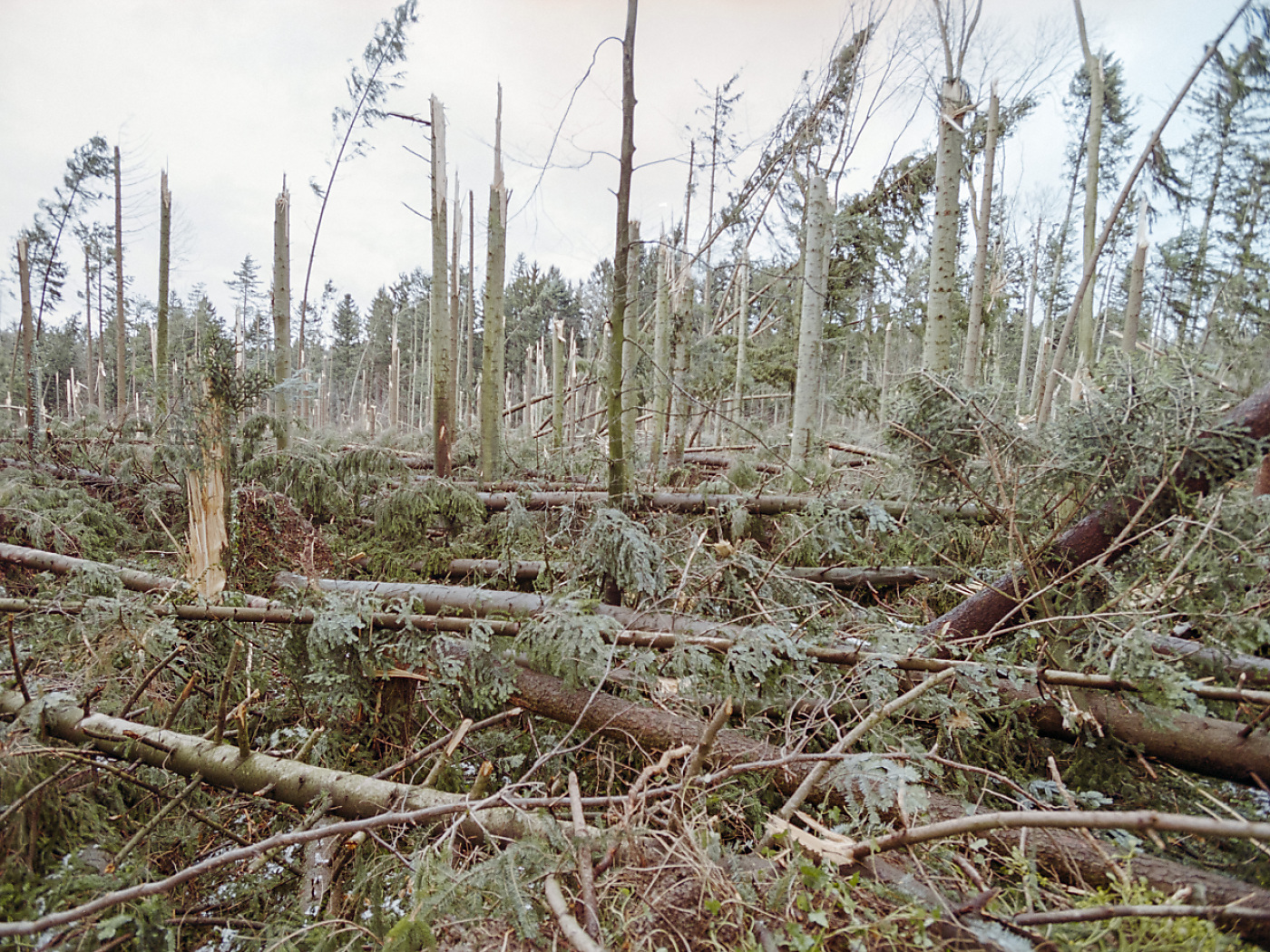
Swiss forests better equipped for storms 25 years after Lothar

Twenty-five years after Hurricane Lothar caused unprecedented damage across the country, Swiss forests are better prepared to cope with such an exceptional disaster, says the Swiss Federal Institute for Forest, Snow and Landscape Research (WSL).
+ Get the most important news from Switzerland in your inbox
Lothar swept across Switzerland on the morning of December 26, 1999, dumping some 14 million cubic metres of timber on the ground. Fourteen people died.
“Lothar showed us the damage that extreme events can cause,” Thomas Wohlgemuth from the WSL told the Keystone-SDA news agency. Across Switzerland’s Central Plateau, the extent was unprecedented, Wohlgemuth said. A further 17 forest owners and two public forestry employees died during clean-up operations.
The Federal Office for the Environment later estimated the total damage at CHF1.35 billion ($1.5 billion) – CHF600 million for buildings and CHF750 million for forests. In all, 2% trees in Switzerland were toppled or snapped.
+ Read more: what will Swiss forests of the future look like?
Cantons Bern, Fribourg, Lucerne and Nidwalden were hardest hit by the storm, which moved from northern France across southern Germany and Switzerland to Austria with winds of up to 272 kmph.
The forestry and timber industry was severely affected; in spring 2000, prices for log wood fell by around a third due to oversupply.
After the storm, and especially after a hot year in 2003, infestations of bark beetles led to further masses of damaged wood – almost two-thirds as much as the storm had caused. When powerful winds overturn forests over large areas, a big increase in such beetles usually follows, at least in spruce-rich areas, the WSL says.
This first affects the fringes of the storm-affected areas and then also the nearby weakened trees. After a storm, damaged spruces must therefore be cleared as quickly as possible, experts say.
Lessons learned
In Switzerland, spruces are not in fact native to the Central Plateau. However, the forestry industry planted the tree across large swathes due to its suitability for timber.
That said, since Lothar, spruces have become much rarer in these areas, the WSL says. This means forests are now better prepared for another unprecedented storm.
Moreover, the WSL says, trees up to 10-20 metres are now standing again in places where the forest was razed 25 years ago. Deciduous species considered climate-resistant, such as oak, cherry, sycamore and Norway maple, have grown back in the storm areas.

More
Chipping away at Switzerland’s forests
As studies by the research centre show, many forests became more structurally diverse after the storm, creating new habitats for animals and plants. Insect diversity has virtually exploded. A study by the Swiss Ornithological Institute also showed that woodpeckers were able to benefit from Lothar, as they feed on insects under tree bark or in rotten wood.
Ultimately, it can be assumed that large storms will happen again sooner or later, the WSL says. Storms which are more severe than Lothar are difficult to imagine in Europe – but with climate change, they cannot be ruled out, it says.
Translated from German by DeepL/dos
This article is an updated version of a news story first published on December 18, 2024
This news story has been written and carefully fact-checked by an external editorial team. At SWI swissinfo.ch we select the most relevant news for an international audience and use automatic translation tools such as DeepL to translate it into English. Providing you with automatically translated news gives us the time to write more in-depth articles.
If you want to know more about how we work, have a look here, if you want to learn more about how we use technology, click here, and if you have feedback on this news story please write to english@swissinfo.ch.

In compliance with the JTI standards
More: SWI swissinfo.ch certified by the Journalism Trust Initiative



























You can find an overview of ongoing debates with our journalists here . Please join us!
If you want to start a conversation about a topic raised in this article or want to report factual errors, email us at english@swissinfo.ch.